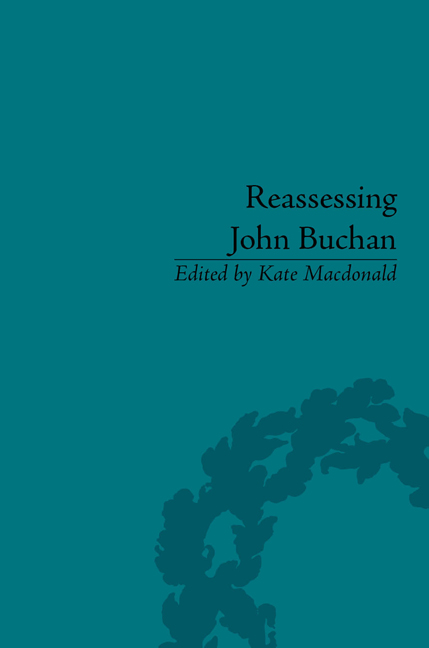Book contents
- Frontmatter
- CONTENTS
- List of contributors
- Introduction
- I Cultural Roots
- II Divided Loyalties
- 6 John Buchan and the South African War
- 7 John Buchan and the First World War: Fact into Fiction
- 8 Buchan and the Pacifists
- 9 John Buchan, America and the ‘British World’, 1904–40
- 10 Islam and the East in John Buchan's Novels
- 11 Conquistadors: Buchan's Businessmen
- III Literary Art
- Notes
- Works Cited
- Index
9 - John Buchan, America and the ‘British World’, 1904–40
from II - Divided Loyalties
- Frontmatter
- CONTENTS
- List of contributors
- Introduction
- I Cultural Roots
- II Divided Loyalties
- 6 John Buchan and the South African War
- 7 John Buchan and the First World War: Fact into Fiction
- 8 Buchan and the Pacifists
- 9 John Buchan, America and the ‘British World’, 1904–40
- 10 Islam and the East in John Buchan's Novels
- 11 Conquistadors: Buchan's Businessmen
- III Literary Art
- Notes
- Works Cited
- Index
Summary
For much of John Buchan's life he was a champion of closer ties between Britain and the United States. During and after the First World War he played an influential role in shaping Anglo-American relations, through journalism, history, popular fiction and professional diplomacy. His work included leading the British government's wartime propaganda effort, a centrepiece of which was encouraging active American support for the Allies against Germany. His overarching objective was to encourage broad, popular, and mutual understanding between the American and British peoples, including those overseas in the settler dominions. From 1914 onwards, this was a leading personal concern, evident in the subjects he wrote about, the stories and characters he created, and the themes he emphasized – not least in some of his bestselling novels, notably The Thirty-Nine Steps, Greenmantle and Mr Standfast. It was also evident in his direct involvement in international diplomacy. Perhaps most striking was the extent to which his conceptualization of America and its relationship with Britain was shaped by the same ideas that underpinned his enthusiasm for the British Empire.
America was, to Buchan, the epitome of a successful encounter between European pioneers and the wilderness frontier, an encounter Buchan thought was essential for the vitality of the British people. Similarly, the American federal union was seen by Buchan (and many other co-enthusiasts of empire) as a validation of his belief in imperial unity and in the value of the bigger international unit. Buchan also saw America as another example of how fierce local loyalties and differences in outlook (even those strong enough to provoke a civil war) need not be an impediment to successful union, just as he thought national differences within the British Isles or British Empire need not force those groupings apart. Indeed, Buchan sought to resolve the problem of reconciling ethnic, cultural or national differences by proclaiming such differences to be a source of strength rather than weakness.
- Type
- Chapter
- Information
- Reassessing John BuchanBeyond the Thirty Nine Steps, pp. 103 - 116Publisher: Pickering & ChattoFirst published in: 2014



